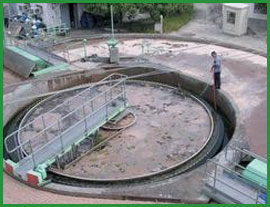Urbanization has encouraged the migration of people from villages to the urban areas in India. With exponential growth in urbanization, a number of environmental problems have emerged. For improving standards of life, running water-supply has been established in most of the cities/towns and even in some villages over the past three decades in India. This has, in turn, led to flush-latrines and much large use of water in homes for bathing, washing of clothes utensils etc, generating significant amount of wastewater. Use of soaps, detergents and amounts of various food materials going to the sink have also grown with improved life standards. Unfortunately, due to paucity of resources sewerage or improved sanitation did not get much attention. Hence sewerage has lagged far behind water supply. A large number of the cities/towns either do not have any sewerage system or the sewerage system is overloaded or defunct. Even where sewers exist, they often leak or overflow, releasing their contents to stormwater or other surface drains or percolate in to soil to reach ground-water. Thus a bulk of pollution gets retained on land to percolate, leach or get washed-off to streams or groundwater.
Discharge of untreated sewage is single most important cause for pollution of surface & ground water since there is a large gap between generation and treatment of domestic wastewater in India. The problem is not only of adequacy of treatment capacity but also operation and maintenance of treatment plants. Several sewage treatment plants are established under centrally funded National River Action Plan. However, their operation and maintenance is generally not satisfactory. If massive investment is done on establishing sewage treatment plants and not 2 properly operated, the entire exercise becomes futile. In order to ensure that these STPs function properly, it was felt necessary to carry out study to evaluate their performance and identify main problems both technical and administrative to remedy the situation. CPCB with the help of a consultant initiated a detailed study of the STPs in India. The study includes individual plant visit, discussion with operating staff, evaluating technological aspects & management aspects to bring out the major cause of poor performance.


Discharge of untreated sewage is single most important cause for pollution of surface & ground water since there is a large gap between generation and treatment of domestic wastewater in India. The problem is not only of adequacy of treatment capacity but also operation and maintenance of treatment plants. Several sewage treatment plants are established under centrally funded National River Action Plan. However, their operation and maintenance is generally not satisfactory. If massive investment is done on establishing sewage treatment plants and not 2 properly operated, the entire exercise becomes futile. In order to ensure that these STPs function properly, it was felt necessary to carry out study to evaluate their performance and identify main problems both technical and administrative to remedy the situation. CPCB with the help of a consultant initiated a detailed study of the STPs in India. The study includes individual plant visit, discussion with operating staff, evaluating technological aspects & management aspects to bring out the major cause of poor performance.

